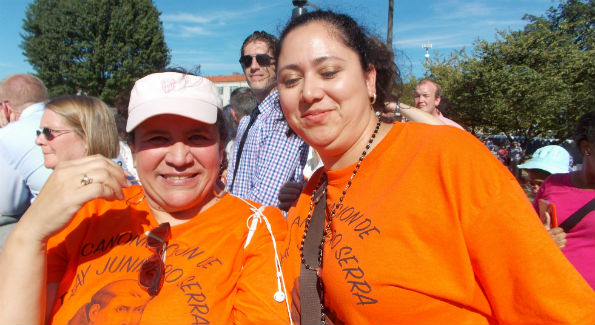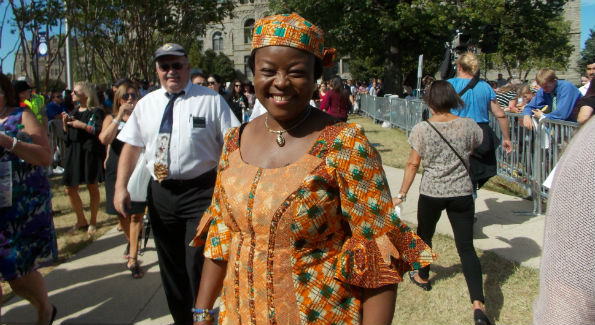Pope Francis arrives in Washington and celebrates Mass on his first-ever visit to the United States.
Story and photos by Kirsten Obadal
Twenty-five thousand people can make a lot of noise, and the hubbub of voices while we waited for Pope Francis’ arrival at the Shrine of the Immaculate Conception was indeed noisy.
But what is more remarkable is that this same crowd can become completely and totally silent in unison, which it did to show respect to the U.S. Bishops as they processed behind an honor guard of laymen from the Knights of Columbus Catholic fraternal organization.
After arriving Tuesday night in the Nation’s Capital, where he’s staying at the Papal Nuncio on Embassy Row, the Pope was received at The White House by President and Mrs. Obama, before parading down Constitution Avenue to throngs of thousands of faithfuls, some who’d pilgrimaged here from hundreds of miles away.
At the Basilica, there was a lot of enthusiasm from the assembled faithful at the arrival of the Cardinals as well, who came to the Basilica in buses.
All of the clergy changed from their scarlet and black cassocks into white vestments, the proper liturgical color for a canonization.
Cheers broke out when the Jeep Popemobile appeared at the foot of the hill on Michigan Avenue, and made its way slowly through the throng, as the faithful called out, “Viva El Papa,” and “Papa Francisco!”
Although Pope Francis is something of a rock star, the faithful behaved with deep reverence and prayer during the Mass, turning their prayers and intentions to God.
The Mass had a particular meaning in the life of the church, beyond a state visit by the Pontiff; it was a celebration for the canonization of Juniperro Serra, who has now been recognized as a saint.
Father Juniperro Serra was a Spanish missionary in the 18th century, and a Jesuit Priest, like Pope Francis.
Serra was sent to Mexico by his community in 1749 and later to California to establish missions, and he remined there for the rest of his life. According to the US Catholic Conference of Bishops, Serra learned the Otomí language and used a visual method of teaching religion.
“Zealous in preaching and in promoting both liturgical and popular devotions, he succeeded in bringing the Pame people to practice the faith in an exemplary way,” the Conference said.

Blanca Castillo, and her niece Karla Marroquin made a pilgrimage from San Francisco with their church to attend the Papal Mass in D.C.
Economically his mission prospered through the introduction of domestic animals, the fostering of agriculture and the development of commerce. He also defended Indian rights against non-native settlers in a protracted contest over the valley of Tancama.
During building operations on his church, he worked as an ordinary day laborer.
In his homily, Pope Francis reiterated a gospel message: “Far from expecting a pretty life, smartly-dressed and neatly groomed, He embraced life as he found it. It made no difference whether it was dirty, unkempt, broken.
Jesus said: Go out and tell the good news to everyone. Go out and in my name embrace life as it is, and not as you think it should be.
Go out to the highways and byways, go out to tell the good news fearlessly, without prejudice, without superiority, without condescension, to all those who have lost the joy of living. Go out to proclaim the merciful embrace of the Father. Go out to those who are burdened by pain and failure, who feel that their lives are empty, and proclaim the folly of a loving Father who wants to anoint them with the oil of hope, the oil of salvation.”
After the final blessing at the end of the Mass, one stentorian male voice called out, “Viva El Papa,” and thousands in the crowd repeated the reply, “VIVA!”
Certainly with this crowd, his message of hope resounded deeply in their hearts.


